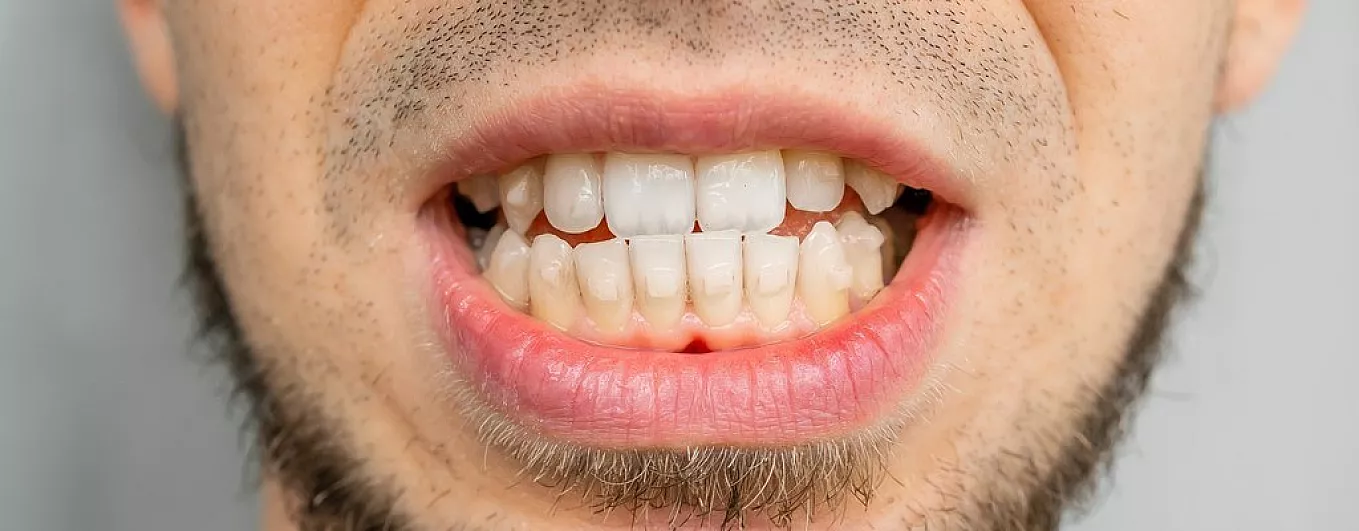
An underbite is a type of oral malocclusion, which means your teeth aren't aligned properly. In this condition, the lower teeth and jaw are positioned further forward than the upper teeth. An underbite can range from mild to severe, and there are many possible causes for it. Underbites are usually classified into two types: dental underbites (related to the teeth) and skeletal underbites (related to the jawbone).
In a dental underbite, the issue comes from the way the teeth are positioned. In a skeletal underbite, the problem is with the alignment or size of the jawbones. Either way, an underbite can lead to problems with chewing and speaking and even cause discomfort.
In this article, we’ll take a closer look at the causes, symptoms, and effects of an underbite. We’ll also answer common questions like, "Can Invisalign fix an underbite?" and "Do braces work for underbites?" Finally, we’ll discuss the potential costs of underbite treatment and what options may be best for you.
What Causes an Underbite?
An underbite can develop for several different reasons, including your family history, childhood habits like thumb/finger sucking or overuse of a pacifier, and other environmental factors. Below are some of the most common causes of an underbite:
- Underbites are often inherited. If one or both parents had an underbite, their children might be more likely to develop the condition.
- Long-term thumb/finger sucking or pacifier use in early childhood can affect the development of the teeth and jaw, leading to misalignment.
- Sometimes, the upper or lower jaw might grow unevenly, causing one to protrude over the other. This type of misalignment can lead to a skeletal underbite.
- An accident or injury to the jaw or face can cause changes to the jaw's structure, leading to an underbite.
- Certain congenital disabilities or medical conditions like a tumor can lead to abnormalities in the development of the jawbones, which can cause an underbite.
What Are the Symptoms and Effects of an Underbite?
A mild underbite may not cause any symptoms and may not need treatment. However, with a mild or severe underbite, you may experience symptoms like:
- Difficulty chewing food, which may lead to digestive issues.
- Speech problems, such as difficulty pronouncing certain words.
- Strain in the jaw muscles, which can lead to discomfort, headaches, or temporomandibular joint (TMJ) disorders.
- Increased risk of dental problems, including tooth decay, cavities, and gum disease. An underbite can also cause excessive wear on your teeth, leading to cracks or damage.
- In some cases, an underbite can interfere with normal breathing, especially if jaw misalignment affects the airways, potentially leading to sleep apnea.
Can an Underbite Be Fixed Without Surgery?
A common question when people are considering treating their underbite is whether they need surgery. The answer all depends on how severe the underbite is.
Surgery is usually unnecessary for mild to moderate underbites. Treatments like orthodontic expanders, braces, or Invisalign® can often correct the issue by gradually shifting the teeth into better alignment. However, for more severe underbites, especially when the jaw itself is misaligned, surgery may be needed to fully correct the problem.
Treatment Options for an Underbite
There are several ways to fix an underbite, and the right treatment depends on how severe the underbite is and the patient’s needs. Common treatments for an underbite include:
Braces
Braces are one of the most common ways to fix an underbite, especially for patients with dental misalignments. They work by gently moving the upper teeth forward so they fit properly over the lower teeth. Braces use a combination of brackets, wires, and bands to move the teeth into the correct position. Treatment can take 18 to 24 months or longer, depending on the severity of the underbite.
Braces are good for treating mild to moderate dental underbites where the problem is related to the position of the teeth rather than the jaw itself. By realigning the teeth, braces can significantly improve both the function and appearance of the bite.
Invisalign
Invisalign is a good choice for those who are looking for a less noticeable option. It uses clear, custom-made trays that slowly shift teeth into the right position. While Invisalign can work for mild to moderate underbites—especially if the problem is with the teeth—it may not be the best choice for severe underbites or cases where the jaw needs a lot of movement.
How Much Does Underbite Treatment Cost?
The cost of treating an underbite can vary depending on how severe the condition is, and the treatment chosen. For example, braces usually cost between $3,000 and $8,000, while Invisalign can range from $3,500 to $8,000. Surgical treatments for more severe underbites can be much higher, as they include hospital fees, the surgery itself, and post-operative care.
If you're considering treatment, it's important to talk to your dentist or orthodontist for an accurate estimate based on your specific needs. Also, check with your dental insurance provider, as they may cover part of the orthodontic treatments or surgery costs.
Treatment for an Underbite
An underbite can affect how you chew, speak, and even feel about your smile, but the good news is that it can be fixed with the right treatment.
If you have an underbite and want to learn more about your treatment options, don’t wait—book a consultation with docbraces today. Whether you or your child needs braces or Invisalign, we offer affordable, flexible treatment plans that work for your lifestyle and budget. You can feel confident that our team of experts will be with you every step of the way, providing personalized care to help you fix your bite and achieve a healthier, more confident smile.




